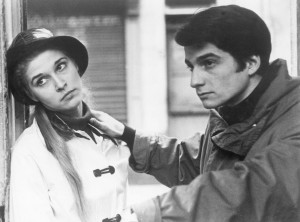Skolimowski Revisited
Just when you thought Jerzy Skolimowski had dipped into the shadows never to produce a film again, he emerged from a 17-year hiatus with two films: Four Nights with Anna and Essential Killing.
The critical acclaim for both films prompted the chief curator of the Museum of the Moving Image, David Schwartz, to host a retrospective of the artist’s work, showing films made throughout the course of his over 50-year career.
“Skolimowski is certainly one of the most important contemporary Polish directors ever,” Schwartz said.
Known for his potent imagery, Skolimowski has covered topics spanning from Stalinism and sexual obsession to war and boxing. He depicts these themes boldly using long shots of dilapidated buildings, reflections of bombed out buildings in trash filled puddles, as well as two lone dogs walking through apocalyptic landscapes. And while several of Skolimowski’s films are autobiographical reviews of post-war Poland, not all his films are doom and gloom.
His comical Le depart follows the wiles of a hair dresser obsessed with race cars. Other films deal with romance, sexual obsession, and eccentricity. But what really links many of his films despite their breadth of subject, says Schwartz, is that his characters tend to be outsiders, “He often has characters who are alienated trying to find their place in the world.”
Skolimowski is a stranger himself in some senses. After his film Hands Up was censored for its anti-Stalinist message, Skolimowski fled Poland. He then spent subsequent years trying to find his place in the world, spending large chunks of time in Los Angeles, London, and Malibu. It’s no wonder he might have felt like a stranger in his own country.
As a child growing up during World War II, his family was not always in step with the ruling edict. The Nazi’s killed his father, who was involved with the Polish resistance. Skolimowski would later cultivate his experience as a child of war-time Poland into the potent imagery his films are known for. He first debuted as a filmmaker with the release of The Menacing Eye in 1960, a short film involving a knife thrower and his lover, set to a very foreboding score.
While the MOMI will not be showing The Menacing Eye, with the help of the Polish Cultural Institute they will showcase many of Skolimowski’s most obscure movies.
Natalia Babinski, a film and television programmer from the Polish Institute, played a key role in bringing Skolimowski’s work back into the United States for this retrospective. A long time fan of the director, she says he is second only to filmmaker Roman Polanski in notoriety.
“Polanski has strong scripts, mostly thrillers that are open to a mainstream audience. Skowlimowski is not considered a writer for hire. His films are more artful and laid back and loose. Naturally those projects don’t get [the same] kind of box office returns,” Babinski said.
Polanski and Skolimowski met in film school and have collaborated many times over the years. Skolimowski actually co-wrote Polanski’s highly acclaimed 2003 film, Knife in the Water.
Schwartz says up until recently Skolimowski’s films have always tended towards experimental.
“The new films feel very pared down. They’re just more distilled in a way. In the previous films he’s trying out a lot of different techniques and mixing a lot of different tones. In Four Nights with Anna for example, it builds very slowly and focuses on this obsessed character,” he said.
Released in 2008, Four Nights with Anna describes one man’s eccentric obsession with his neighbor, who he witnesses being raped. The movie follows the man as he drugs his neighbor so he can take care of her while she sleeps. There is very little dialogue and a rather sustained focus on the man’s obsession.
Similarly in his newest film, Essential Killing, there is again minimal dialogue and an intense focus on one man’s race for survival. Mohammed, an Afghan detainee accused of being a Taliban insurgent, played by Vincent Galo, manages to escape from the Polish camp where he’s being kept. And so begins his long trek for survival and freedom in an unknown land. The landscapes depicted are beautiful and Skolimowski breaks his protagonist down to his most primal state.
The MOMi’s showcase will continue until July 3rd. Schwartz says that so far the retrospective has been a solid success among patrons because Skolimowski is as relevant now as ever.
“I think we’re living in such a fluid world right now where people are moving around so much. There’s so much immigration and rootlessness in the world and I think these films address that. This sense of trying to find your place in the world. There’s a timeless quality about them,” he concluded.












